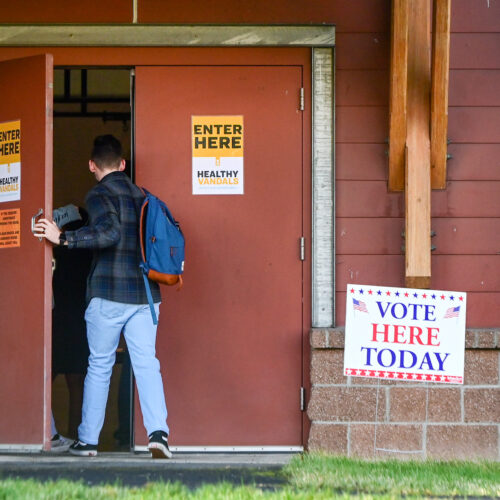
Measure 112 passes, removing slavery language from Oregon Constitution
Listen
(Runtime 0:58)
Read
By Conrad Wilson
Oregon voters passed a measure that strips language from the state’s constitution allowing for slavery and involuntary servitude when used as a punishment for a crime. Notwithstanding more than 500,000 people voting to keep the language, unofficial returns Tuesday night indicated that the measure was passing by a clear margin.
“Talking with some voters, there was confusion about the measure and whether that language was needed for there to be accountability for people who had committed crimes,” said Sandy Chung, executive director of ACLU of Oregon, which supported Measure 112.
Nevertheless, she said, no one in Oregon, not even opponents of the measure, support slavery. “Oregon voters have spoken and said it is our values to not have slavery any longer in the constitution for any people,” Chung said.
Sterling Cunio, who is on the board of directors with Oregonians United to End Slavery which backed Measure 112, said the vote sends a powerful message.
“The idea that we as a state have said that no human being – regardless of their past – should be considered a slave or involuntary servant, how is that not exciting?” Cunio said Tuesday night. “To see that not only Oregonians voted to remove this language from our state’s document, but the hope and the message, the optimism that is serves for people who are currently incarcerated who have been deemed and classified slaves. I can’t tell you what a relief it is to know that there is no longer a legal status of slave or involuntary servitude in Oregon.”
Last year, state lawmakers overwhelmingly approved Senate Joint Resolution 10, putting the proposed constitutional change before voters this November.
The resolution notes that Oregon’s constitution “contains antiquated language” and reads “there must be no exception to an unqualified and absolute prohibition on slavery and involuntary servitude.”
Section 34 of the Oregon constitution currently states: “There shall be neither slavery, nor involuntary servitude in the State, otherwise than as a punishment for crime, whereof the party shall have been duly convicted.”
It’s the second part of the sentence that voters were asked to consider removing from the constitution.
Support behind Measure 112 was broad with no formal opposition campaign.
Proponents argued it was a statement of values to remove the language. However, eliminating “involuntary servitude” as punishment for a crime concerned some, particularly those running the state’s prison system and local jails. In many cases, those facilities operate off the labor of people in custody. For example, the Oregon Department of Corrections requires people in custody to work and pays as little as $8 per month, according to information provided by the agency.
While there has been no “vote no” campaign, the Oregon State Sheriffs’ Association opposed Measure 112. In a statement filed with the Secretary of State’s Office, the sheriffs stated that they “do not condone or support slavery and/or involuntary servitude in any form. With this being said, Oregon Sheriffs cannot support Measure 112 as drafted-it creates unintended consequences for Oregon Jails that will result in the elimination of all reformative programs and increased costs to local jail operations.”
In 1994, voters passed a constitutional amendment that established work requirements for people in custody. Supporters of Measure 112 said during the campaign that the intent was not to repeal work requirements, but rather “work in tandem” with those requirements.
Slavery has always been unconstitutional in Oregon, which should not be seen as indicating that the state has had no issues with racism or with how it treats prisoners. In fact, the state’s original constitution banned Black people from living or working in the state.
Supporters say the measure isn’t only for states with a history of slavery though. Since 2018, voters in Nebraska, Utah and Colorado – all states where slavery was never legal – approved changes eliminating the word “slavery” from their constitutions.
Earlier this year in Colorado, people in custody sued the governor and prison system arguing that forcing them to work violates that state’s anti-slavery provision, which voters passed in 2018. The lawsuit is pending. A previous lawsuit to raise wages for people in custody was dismissed.
Voters in Vermont, Alabama and Tennessee approved similar measures to remove racist language and slavery as punishment for a crime on Tuesday. In Louisiana, a measure to remove slavery as a punishment for a crime, failed.
Copyright 2022 Oregon Public Broadcasting. For more, visit opb.org
Related Stories:

University of Idaho polling location sees Election Day difficulty
Huge voter turnout and same-day registration caused long delays at UI Student Rec Center

Schrier wins reelection for 8th Congressional District
Listen (00:56) Read U.S. Rep. Kim Schrier, a Democrat, won re-election Thursday in Washington’s 8th Congressional District, defeating Republican challenger Carmen Goers. Schrier will return to Washington, D.C., in January

Democrats outraged by ‘horrific’ GOP text messages sent to central Washington Latino voters
Democrats Chelsea Dimas, Maria Beltran and Ana Ruiz Kennedy are running in Washington’s 14th Legislative District in central Washington. They were the targets of some GOP text messages to Spanish-speaking















